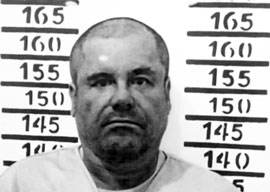
January 14, 2016

JoaquÃn "El Chapo" Guzmán
Sean Penn justifies his own ambiguous act of journalism by pointing out a disparity:
Perhaps in the tunnel vision of our puritanical and prosecutorial culture that has designed the War on Drugs, we have similarly lost sight of practice, and given over our souls to theory.
The irony is, for all the bloodshed, supply of drugs from Mexico to the USA and beyond has not once been slightly dented in twenty years; nor have street prices increased beyond inflation.
The industry’s “sweet spot” is the distribution, which is why Mexico”due to its location”has captured the distribution end almost entirely, speaking globally. Manufacturing has little value, perversely, compared with the money made in “transpo.” Only 1 percent of total retail sales finds its way back to the drug cultivators in the Andes, OAS research shows. Money has no morality, but can an economy have a conscience? Can a “moral economy,” a just economy, exist in practice?
No.
Demand for drugs is now steady, growing slightly year on year, meaning it’s a mature industry, a so-called “steady-state” economy (like that of a first-world nation). It’s unafflicted by the “addiction to leverage” we suffer in legitimate financial markets, and not one peso of tax is paid the government. The industry runs free of regulatory restraint, standards, checks and balances, corporate or income taxation, health and safety measures, insurance dues, or consumer rights for the end buyer. You can”t lose. It explains why a Chinese importer, Ye Gon, was unable to launder the $205 million in cash (towers of $100 bills) he kept in his house.
Nobody dares think about the financial implications of decriminalizing and taxing one of the biggest businesses on the planet. Some economists believe Mexico’s economy is sustained by the black market’s invisible contribution; so much so, it may account for 15 percent of the nation’s GDP. Removing even 5 percent from Mexico’s total GDP is…unthinkable. The economy, the world’s 15th-largest by nominal GDP, just behind Spain, could collapse without the on-tap liquidity provided by narco commerce.
The real question is not: What would happen if the drug trade ended? Because it will never end, for one thing. The question is: What proportion would a decriminalized drug trade represent”in a competitive, fiscally audited marketplace”versus the 10 to 15 percent of Mexico’s GDP currently derived from drug business?
The answer is far lower than 15 or 10 percent, because global competition would reduce prices and erode Mexico’s near monopoly on supply-side distribution.
In the end, it’s best to leave things as they are. It’s more profitable, for sure. The recapture of a super-senior narco is a reassuring media spectacle; however, prison detention provides narco kingpins with a secure headquarters, flush with fresh talent and the luxury of time to manage their megacorps even better”time that is wasted when you”re on the run.